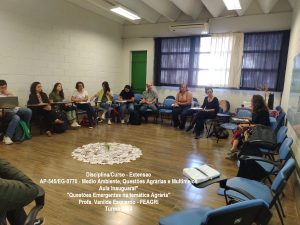
|
PROGRAMA – DISCIPLINA/CURSO – EXTENSÃO
AP-545/EG-0770 – MEIO AMBIENTE, QUESTÕES AGRÁRIAS E MULTIMEIOS
2° SEMESTRE 2024
|
|
AULAS
|
Conteúdos/Aula
|
Responsáveis
|
| AULA 1
08/08/24 |
Apresentação: Orientações do Grupo de Colaboradores e Esclarecimentos do Curso;
Dinâmica das Sementes;
Pausa de 10 minutos;
Palestra Inaugural – Questões emergentes na temática agrária.
|
Vanilde, Diego, Kellen, Gastão George e Alessandro
|
| AULA 2
15/08/24 |
Diálogos audiovisuais: Apresentação de filmes de participantes do curso de anos anteriores;
Pausa de 10 minutos;
Fabulações audiovisuais – processos criativos
|
Guilherme Landim, Kellen, Diego e George |
| AULA 3
22/08/24 |
Processo de Produção e Criação – Como produzir e realizar um Plano de produção audiovisual;
Pausa 10 minutos;
Dinâmica da imagem – Criar/Pensar uma imagem (individual), produzida pelos participantes, que represente o tema a ser proposto para a parte prática do curso/disciplina – Informar recursos materiais e humanos da disciplina |
Guilherme Landim |
|
AULA 4
29/08/24 |
Palestra III – O documentário no Ecossistema –
Pausa de 10 minutos;
Exercícios: Dinâmica de Grupos |
Gilberto Sobrinho – IA |
| AULA 5
05/09/24 |
Palestra II Questões emergentes na temática patrimônio ambiental
Pausa de 10 minutos;
Atividade Dinâmica – Distribuição da água;
|
|
| AULA 6
12/09/24 |
Introdução ao roteiro: a arte de narrar histórias;
Pausa 10 minutos;
Atividade prática: organização grupos;
|
Guilherme Landim
Alfredo Suppia |
| AULA 7
19/09/24 |
Convidado Especial: Cinema Comunitário
Pausa 10 minutos;
Debate sobre o tema
|
Andrea Molfetta |
| AULA 8
26/09/24 |
Edição I : Roteiro técnico de edição Transcrição, decupagem e organização de material;
Pausa 10 minutos;
Exercícios;
|
Alessandro Poeta e Diego Caroca |
| AULA 9
3/10/24 |
Edição II: Conhecimentos básicos de software e aplicativos de Edição (Adobe Premier, Final Cut – X – Da Vinci e Blender;
Pausa 10 minutos
Exercícios: Filmagem, Enquadramentos, Som e Iluminação
|
Alessandro Poeta e Diego Caroca |
| AULA 10
10/10/24 |
Campo: Preparação para Campo de Pesquisa, planejamento e processos de produção para cada grupo;
Reunião de grupos com orientadores/as e depois compartilhamento em roda de convers
|
Todos |
| AULA 11
17/10/24 |
Campo (turma realiza filmagem)
|
Grupos/Equipes |
| AULA 12
24/10/24 |
Encontro: Pendências e questões sobre a edição/montagem;
Apresentação do relato de processo dos grupos;
Relatórios dos grupos;
|
odos/Equipes
Orientadores |
| AULA 13
31/10/24 |
Edição; |
|
| AULA 14
07/11/24 |
Edição; |
|
| AULA 15
14/11/24 |
Apresentação final dos filmes na Adunicamp e no MIS e disponibilização por meio da plataforma Sementeia.org acervo do MIS e debate com os grupos.
|
Todos/Convidados |
REFERÊNCIAS E BIBLIOGRAFIAS
1.- MULTIMEIOS
ANG, Tom. Vídeo Digital – uma introdução. (Tradução: Assef Nagib Kfouri e Silvana Vieira) .Editora Senac/São Paulo, 2007.
BUTLER, J. Problemas de gênero: feminismo e subversão da identidade. Rio de Janeiro, RJ: Civilização Brasileira, 2003.
CARVALHO, N. S. Cinema e representação racial: o cinema negro de Zózimo Bulbul. São Paulo: USP, 2005.
EISENSTEIN, Sergei. A Forma do Filme. Apresentação, notas e revisão técnica: José Carlos Avellar. Tradução: Teresa Ottoni. Rio de Janeiro: Jorge Zahar Editor, 2002.
LEONE, Eduardo; MOURÃO, Maria Dora. Cinema e montagem. São Paulo: Ática, 1993.
LINS, Consuelo e MESQUITA, Claudia. Filmar o Real – Sobre o documentário brasileiro – Contemporâneo. Rio de janeiro: Zahar, 2011
LINS, Consuelo. O documentário de Eduardo Coutinho. Rio de janeiro: Zahar, 201
MELLO, C. Extremidades do vídeo. São Paulo: Senac, 2008.
NICHOLS, Bill. Introdução ao documentário. Campinas: Papirus, 2016.
PUPO, M. V.; TAIT, M. M. L; LACERRA, B. S.; JUNQUEIRA, K; WELLE, J. Plataforma Sementeia: um espaço de diálogo e articulações de resistências no campo e na cidade. Cadernos de Ciência e Tecnologia – Embrapa (aceito maio de 2017).
RAMOS, Fernão Pessoa. Mas afinal… O que é mesmo documentário? São Paulo: Editora. SENAC, 2008.
___________________. Teoria Contemporânea do Cinema – Documentário e Narratividade Ficcional (vol II). São Paulo, SENAC, 2005.
SANTORO, L. F. A imagem nas mãos: o vídeo popular no Brasil. São Paulo: Summus, 1989.
SILVA, L. H. ; JUNQUEIRA, K. ; TAIT, M. M. L. Sementeia: multimídia, educação e resistências
em uma plataforma virtual. Revista ClimaCom, v. 1, 2015
SODRÉ, M. Claros e escuros: identidade, povo e mídia no Brasil. Petrópolis: Vozes, 2000.
2.- QUESTÕES AGRÁRIAS
BERGAMASCO, Sônia Maria Pessoa Pereira; NORDER, Luiz Antônio Cabello. A Alternativa dos assentamentos rurais: organização social, trabalho e política. São Paulo: Terceira Margem, 2003. Ler: Cap.1 (págs 19-35) e Cap.2 (págs.41-60).
GRAZIANO DA SILVA, (org.). Estrutura Agrária e Produção de Subsistência na Agricultura Brasileira. Ed. Hucitec, 1978. 240p.
GRAZIANO DA SILVA, J. O que é questão agrária. Ed. Brasiliense, 1981. (Coleção Primeiros Passos, 18).
LEITE, Ségio; HEREDIA, Beatriz, MEDEIROS, Leonilde; PALMEIRA, Moacir; CINTRÃO, Rosângela. Impactos dos assentamentos: um estudo sobre o meio rural brasileiro. Brasília: Núcleo de Estudos Agrários e Desenvolvimento Rural; São Paulo: Editora UNESP, 2004. 392p. Ler: págs. 37-59.
VEIGA, J.E. O que é reforma agrária. São Paulo, Brasiliense, 1981. 87p. (coleção Primeiros Passos, 33).
3.- AMBIENTE – PATRIMÔNIOS PRESERVAÇÃO
ARAÚJO, M. A. R. (org). Unidades de Conservação no Brasil: da República à Gestão de Classe Mundial. Belo Horizonte: Segrac, 2007.
BRITO, M. C. W. Unidades de conservação – intenções e resultados. 2ª ed. São Paulo: Annablume: Fapesp, 2003.
CAREY, M. “Latin American Environmental History: Current Trends, Interdisciplinary Insights, and Future Directions” En Environmental History 14, pp. 221-252, 2009.
DUARTE, R. H. História e natureza. Belo Horizonte: Autêntica, 2005.
VARINE, H. As raízes do futuro – o patrimônio a serviço do desenvolvimento local. Editora Medianiz. Porto Alegre: 2012.
DIEGUES, A. C. O mito moderno da natureza intocada. São Paulo: Hucitec, 2001.
SEIXAS, J.A. Percursos de memória em terras de história: problemáticas atuais. In: BRESCIANI, S.; NAXARA, M.(org.). Memória e (res)sentimento. Campinas: UNICAMP, 2001.
4.- Laboratório Multiusuário de Comunicação – TERRAMÃE
BERNARDET, J. C., Cineastas e imagens do povo, São Paulo, Ed. Brasiliense1985.
CAMPOS, Flavio. Roteiro de Cinema e Televisão.
GIL, Antonio Carlos. Como Elaborar Projetos de Pesquisa. Editora Atlas, S.A. 2002
LEBEL, Jean – Patrick. Cinema e Ideologia. In:. Formas cinematográficas e ideológicas em si mesmo: sobre a desconstrução do cinema págs. 43-48. Editora Mandacaru. 1972.
ONG, W., Oralidade e cultura escrita – a Tecnologização da palavra, Ed. Papirus, Campinas/SP, 1998.
5.- Referências de Site – Digital
Site voltado a criação de roteiros e técnicas de escrita
http://www.massarani.com.br/Roteiro.html
Site com diversas indicações de publicações sobre cinema documentarios – Ambiente e Multimeios.
https://labterramae.nepam.unicamp.br/
https://www.youtube.com/@CanaldeComunicacaoTERRAMAE






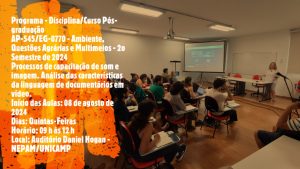

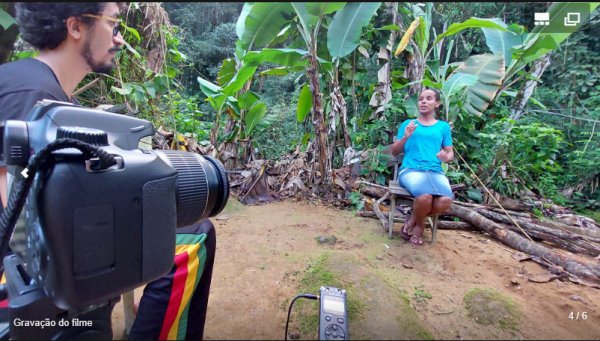
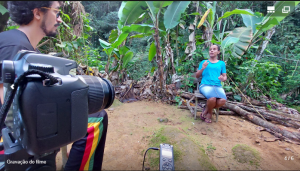
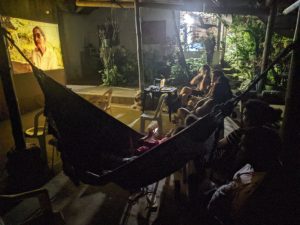
 No dia 30 de Novembro de 2023 teremos a sessão REFLORESTAR IMAGINÁRIOS com cine-debate às 09h no Auditório da Adunicamp. (Entrada gratuita, sem inscrição prévia)
No dia 30 de Novembro de 2023 teremos a sessão REFLORESTAR IMAGINÁRIOS com cine-debate às 09h no Auditório da Adunicamp. (Entrada gratuita, sem inscrição prévia)